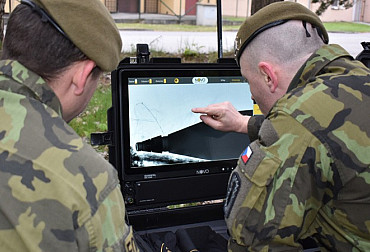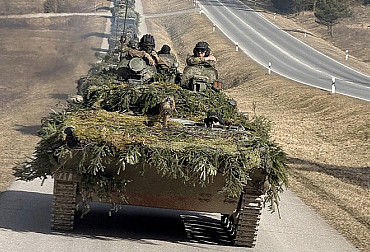We need a powerful, robust and technologically advanced defence industry
The Government of Prime Minister Petr Fiala has a lot to tackle. The problems and challenges are due to a combination of a turbulent era in international relations and the outdated and neglected functioning of the state and its infrastructure. If we want to defend our sovereignty and independence, in other words, to work towards an effective security policy, we must be able to stand up to the international arena. In this respect, we need to be able to adapt to the needs that the international situation places on us. We do not set the parameters of the situation. However, the neglected state and its functioning is an area that is entirely in our hands and no one else can solve it for us. Moreover, a functioning and strong state is a necessary condition for defending sovereignty and independence at the international level.
The war in Ukraine, among other things, demonstrates and confirms one fundamental thing in terms of national defence. The ability to provide the armed forces with military equipment of the necessary quality and the ability to replace losses is absolutely crucial. Ukraine was not prepared for Russian aggression in this respect at all, and the Ukrainian demands for foreign arms supplies are proof of this. (It is also proof that Ukraine was not preparing for war against Russia, as Moscow's propaganda claims, and justifies its military action as necessary self-defence.) It is a great lesson for us that the world has not changed much - we have all witnessed the very slow and hesitant decision-making even of states friendly to Ukraine regarding the provision of arms and especially heavy weapons. The platforms that we have in place in the army, in the ground forces in particular, we should be able to produce entirely or largely at home. In the case of the Czech Republic, this means that the Czech defence industry must be export-successful so that the capabilities provided to the Czech army also make economic sense - indeed, literally viable.
The above - i.e. the creation of a powerful, robust and technologically advanced defence industry for the needs of the Czech army and security forces - necessarily requires a change in the government's approach to the inherited situation. It is necessary to develop the Czech defence industry in a targeted technological manner, to involve private industrial companies firmly in the security and defence system of the state, and to consolidate the defence industry into industrially and capitally stronger entities. Therefore, it is necessary to abandon the logic of the 1950s, when the state (government) looks at only what is secure and embedded in the state system, what is fully state-owned both in terms of property and owner, and in terms of management. The aim must be to create partnerships and cooperation between the state and the private sector and the logic of transforming the approach to state-owned enterprises in favour of the instrument as a legal entity that will provide the state with the necessary influence and control. The state will not do what it cannot and will never be able to do: managing enterprises in a highly competitive market and finding business-successful actions and models.
 Picture: It is necessary to develop the Czech defence industry in a targeted technological manner, to involve private industrial companies firmly in the security and defence system of the state, to consolidate the defence industry into industrially and capital-strengthened entities. | Members of the Defence Industry Section - Economic Chamber of the Czech Republic
Picture: It is necessary to develop the Czech defence industry in a targeted technological manner, to involve private industrial companies firmly in the security and defence system of the state, to consolidate the defence industry into industrially and capital-strengthened entities. | Members of the Defence Industry Section - Economic Chamber of the Czech Republic
Today, the Czech state has much less influence, control and capacity than it needs, thanks to an approach based on the logic of socialism. In fact, the state-owned enterprises established by the Ministry of Defence, which are supposed to have primarily production and repair capabilities (i.e. mainly LOM Praha and VOP CZ), have been losing know-how, competences and the necessary educated and experienced staff for at least the last twenty years. Anyone can look up the economic results on the Internet, they are negative results in the order of many hundreds of millions of CZK. This long-standing trend and systemic problem must be addressed, even though, for example, LOM Prague managed to achieve a positive economic result last year under new management. In the long term, therefore, the state is sanitising companies that are constantly losing the competences for which it set them up.
This is also due to the low defence budgets since 2006, which meant that they did not receive contracts from the Ministry of Defence and fell into negative results and loss of competences. Therefore, there was virtually zero ability to export. This has led, among other things, to an inability to invest, as no meaningful profit has been generated - also thanks to the management of the Ministry of Defence as the founder of the companies, which illogically has not demanded this for a long time. Meanwhile, private enterprises faced the same situation and showed the opposite result - through more efficient operations (costs), investment and innovation capabilities and the ability to export. The most recent example of how bad the current approach is from the state's point of view is the fact that Ukrainian heavy ground equipment will be repaired by a company from the CSG consortium, when the state has set up a state enterprise VOP CZ for exactly this purpose. However, this enterprise is incapable of repair due to loss of competence, so its slow death continues without any sign of a solution.
For the first time in a long time, we have a Government with both vision and the ability to act to make up for the shortcomings of the past. In the security and defence sector, one of the latest examples of Minister Černochová's capacity to act is the launch of negotiations on a defence cooperation treaty and the gradual increase in the defence budget and the creation of a defence investment fund. The Government should therefore speak in a fundamental way to the outdated system and concept of state-owned enterprises. It should start the process of evaluating the meaningfulness of SOEs in the current concept, including an analysis of the causes of the loss of competences and the miserable economic results. It will certainly result in a detailed finding, supported by numbers and facts, that this is the result of a bad system and approach - SOEs (and the Czech defence system) by definition cannot successfully survive with the logic of the 1950s in the environment of the third decade of the twenty-first century.
Therefore, with numbers and facts in hand, the Government should begin the process of consolidating and linking the state and private sectors of the defence industry. The state should articulate the needs, motivate and control strategic decisions regarding the provision of the military and, where appropriate, co-determine joint ventures or projects through special rights shares. SOEs should become a completely different instrument in the hands of the state, one that will provide legitimate influence and control, not production, management and business results. Creating partnerships between the private and state sectors is necessary to firmly integrate the private defence industry into the security and defence system of the state. At the same time, it will bring consolidation, i.e. greater competitiveness and greater capital strength. Last but not least, it will also benefit the Czech Republic in the form of tax contributions, employment and the building of a technological base.
A final example: The army requires the purchase of a light assault vehicle up to 10 tonnes. No Czech company is currently producing such a product, but technologically and industrially it is exactly the kind of product that the Czech private defence industry can design and produce with quality. It will be a backbone platform that we should want to produce domestically, given the recent experience of Russian aggression against Ukraine. The Ministry of Defence should negotiate with Czech companies (there are at least three) for a domestic solution and possibly enter the project, e.g. through a joint venture, where the state's legal and influential instrument would be the state-owned company VOP CZ.





















